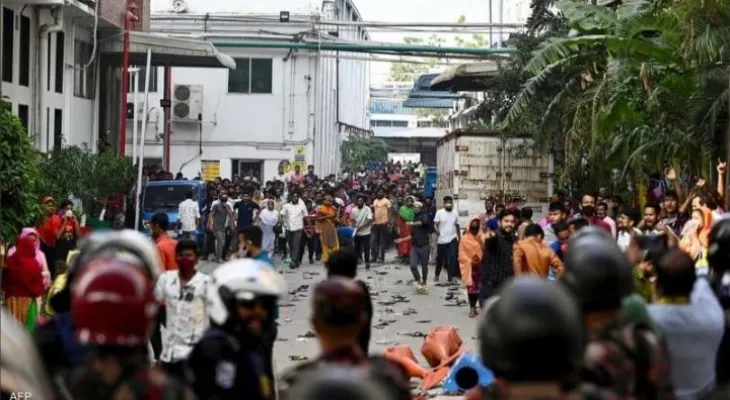Search here
Newspaper
Search here

Arab Canada News
News

Published: November 11, 2023
The clothing manufacturing sector in Bangladesh announced today, Saturday, the closure of 150 factories "indefinitely," while the police have filed charges against 11,000 workers in the sector following violent protests demanding wage increases.
The clothing factories in Bangladesh, which number 3,500, account for about 85% of the country's annual exports, totaling 55 billion dollars. They serve major global brands like "Zara," "Levi's," and "H&M," but working conditions are dire for a large segment of the four million workers in this sector, the vast majority of whom are women whose monthly salary starts at 8,300 taka (75 dollars).
This poor South Asian country has witnessed violent protests as garment workers moved to demand better wages since last month, resulting in the death of at least three workers and looting or damaging over 70 factories, according to the police.
Meanwhile, a government committee proposed raising the minimum wage in the textile sector this week by 56.25% on the basic monthly salary, to reach 12,500 taka (104 euros), a sum immediately rejected by the unions, who considered the proposal "ridiculous."
On Thursday, confrontations occurred between about 15,000 workers and the police on a highway. Protesters resorted to looting the large Tosuka factory and dozens of other factories.
Also in statements, Police Inspector Mosharraf Hussain explained that "the police filed charges against 11,000 unidentified individuals following the attack on the Tosuka garment factory," noting that Bangladesh police are accustomed to filing charges against thousands of people — without naming them — after major protests and political violence, a tactic that critics say is a means to suppress opponents.
Sources quoted police officials saying that 150 factories have closed their doors in the main industrial cities of Ashulia and Gazipur north of the capital Dhaka, amid concerns about more strikes being organized with the beginning of the workweek in Bangladesh on Saturday.
Also, the police chief of Ashulia area, Sarwar Alam, told "Agence France-Presse" that "manufacturers resorted to Article 13/1 of the labor law and closed 130 factories indefinitely in Ashulia, claiming they were organizing illegal strikes."
Sarwar Alam added that at least 20 factories have also closed in Gazipur, the country's largest industrial area.
Ashulia is considered a stronghold of the largest textile factories in Bangladesh, as some employ up to 15,000 workers in a single multi-story building.
This past Thursday, the police used rubber bullets and tear gas against about 10,000 workers in Ashulia who threw stones at officers and factories. Protests demanding a rise in the minimum wage during the past two weeks are considered the worst in more than a decade in the country.
Human rights groups have previously warned that such mass lawsuits filed against thousands of unknown persons give the police license to target innocent people.
It is noteworthy that the wage protests pose a major challenge to Prime Minister Sheikh Hasina, who has ruled the country since 2009, while facing significant competition from the opposition ahead of elections scheduled before the end of January.
The Prime Minister has rejected any further wage increases for workers, warning that violent protests may lead to job losses.
Additionally, Sheikh Hasina said on Thursday: "If they go out to protest on the streets incited by someone, they will lose their jobs and will have to return to their villages."
She continued: "If these factories close and production and exports are disrupted, where will their jobs be? They must understand that."
However, unions organized protests defying Sheikh Hasina's warnings, and workers rejected the committee's decisions because the proposed wage increase does not match the rising costs of food, rent, healthcare, and school fees for their children.
The "Clean Clothes Campaign," based in the Netherlands and advocating for garment workers' rights, rejected the new wage level and described it as a "poverty wage."
The United States, one of the largest buyers of clothes made in Bangladesh, condemned the "violence against workers" and called for "addressing the increasing economic pressures faced by workers and their families."
Comments